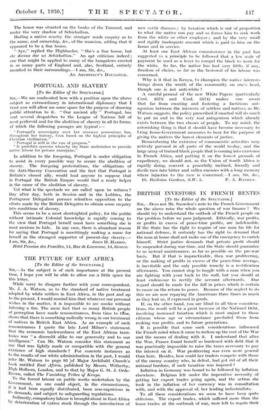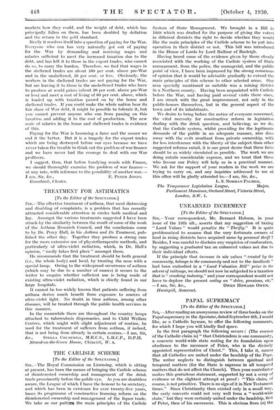BRITISH INVESTORS IN FRENCH RENTES
[To the Editor of the SPECTATOR.] SIR,—Does not Mr. Snowden's note to the French Government on the above raise the whole question of war finance ? We should try to understand the outlook of the French people on the problem before we pass judgment. Ethically, war profits, or profits in excess of peace-time profits, are indefensible. If the State has the right to require of one man his life for national defence, it certainly has the right to demand that the man at home shall not make use of the emergency to enrich himself. Strict justice demands that private profit should be suspended during war time, and the State should guarantee to us instead maintenance, as far as possible on the pre-war basis. But if that is impracticable, then war profiteering, or the making of profits in excess of the peace-time average, is inevitable and the only possible remedy is a rectification afterwards. You cannot stop to haggle with a man when you are fighting with your back to the wall, but you should at least endeavour to rectify the account afterwards. Due regard should be made for the fall in prices which is certain to ensue on the return to peace. Because of the neglect to do this we are now repaying the Americans three times as much as they lent us, if expressed in goods.
If, on the other hand, you are blind to all these considera- tions, the result will be a great increase of the National Debt, involving increased taxation which is most unjust to those citizens whose age or circumstance precluded them from making war profits, and to future generations.
It is possible that some such considerations influenced the French mind when it came to reckon up the cost of the War and the means of dealing with it. I understand that after the War, France found herself so burdened with debt that it was practically impossible to raise the taxes necessary to pay the interest on it. War profiteering was even more general than here. Besides, how could her traders compete with those of the enemy country who, in defeat, had got rid of all their national burdens, if such taxation was imposed ?
Inflation in Germany was bound to be followed by inflation elsewhere. Belgium felt under the imperative necessity of getting her export trades going again, and the action she took in the inflation of her currency was in consultation with, and with the approval of, her leading industrialists. To all these considerations we seem to have been quite oblivious. The export trades, which suffered more than the home trades at the outbreak Of war, Were left to regain their markets how they could, and the weight of debt, which has principally fallen on them, has been doubled by deflation and the return to the gold standard.
Really it resolves itself into a question of paying for the War. Everyone who can has very naturally got out of paying for the War by demanding and receiving wages and salaries sufficient to meet the increased taxation due to the debt, and has left it to those in the export trades, who cannot do so, to carry the burden. Therefore, we find that wages in the sheltered trades are about 100 per cent, above pre-War and in the unsheltered, 50 per cent, or less. Obviously, the workers in the sheltered trades are not paying for the War, but are leaving it to those in the unsheltered trades who have to produce at world prices (about 20 per cent, above pre-War or less) and meet a cost of living of 60 per cent, above, which is loaded up with taxation passed on by the home and sheltered trades. If you could make the whole nation bear its fair share of War debt, it might be possible to tolerate it, but you cannot prevent anyone who can from passing on this taxation and adding it to the cost of production. The new scale of salaries in the home and sheltered trades is evidence of this.
Paying for the War is becoming a farce and the sooner we end it the better. But it is a tragedy for the export trades which are being destroyed before our eyes because we have never taken the trouble to think out the problem of war finance and we have never had the courage to deal with our War profiteers.
I suggest, then, that before bandying words with France, we should thoroughly examine the problem of war finance— at any rate, with reference to the possibility of another war.—





















































 Previous page
Previous page